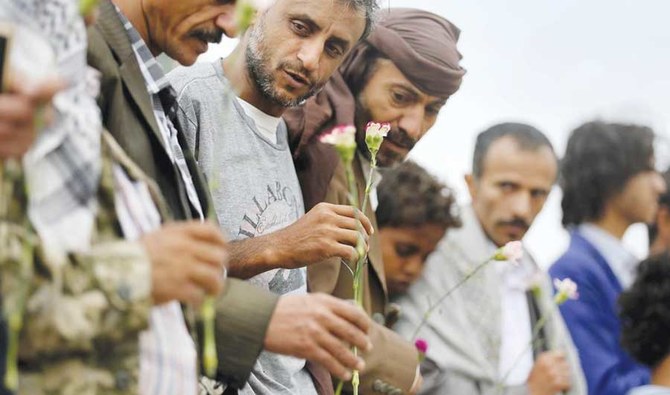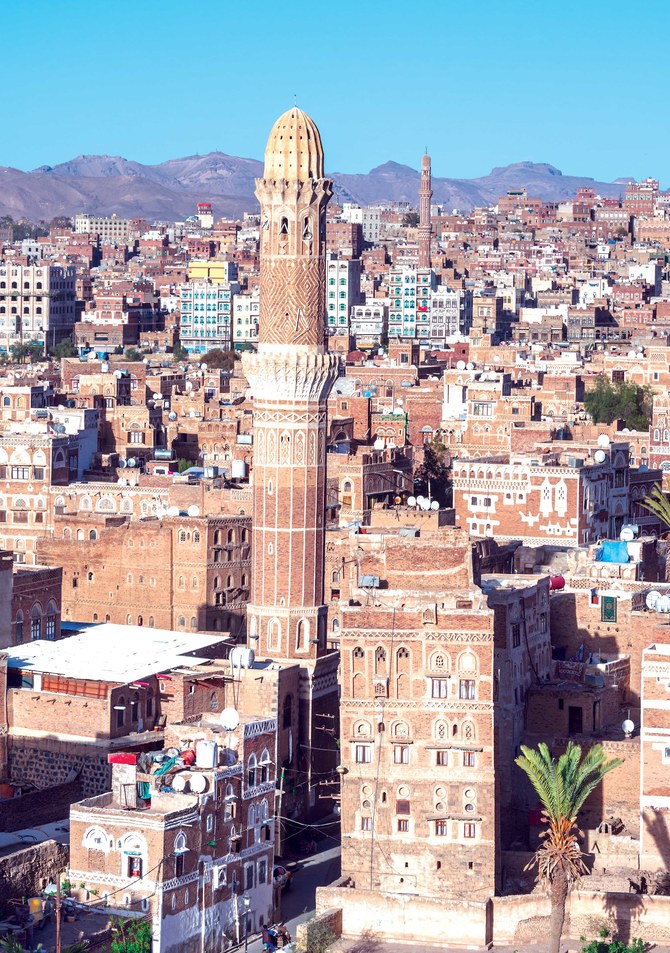ABU DHABI: The world is familiar with the toll that the ongoing conflict and humanitarian crisis has taken on Yemeni civilians. Less well known is the precarious situation of an estimated 1,000 followers of the Baha’i faith who live in Yemen, mostly in the Houthi-held capital Sana’a.
With the Houthis’ military advances in Yemen in 2014-2015, the Middle East began to see a steady redrawing of the geopolitical map, and two emerging streams of persecution and judicial harassment of Baha’is.
In Iran, where the Baha’i faith originated, there are now about 300,000 Baha’is, constituting the country’s largest religious minority.
Since the Iranian revolution of 1979, more than 200 Baha’is have been executed or killed, hundreds more have been imprisoned, and tens of thousands have been deprived of jobs, pensions, businesses and educational opportunities due to their religious beliefs and practices.
A similar fate has befallen Yemen’s much smaller Baha’i community in Houthi-controlled areas.
In April this year, the US State Department voiced deep concern over “credible reports that the Houthis continue to severely mistreat, arbitrarily detain, and torture Baha’is in Yemen.”
The Baha’i representation at the UN has accused Iran of encouraging and instructing Houthi officials to crack down on Yemeni Baha’is.
Few individuals symbolize the persecution of Yemeni Bahai’s under Houthi rule like Hamid Kamal Mohammad bin Haydara, believed to be the community’s unofficial leader there.
According to the US Commission on International Religious Freedom (USCIRF) — an independent, bipartisan federal government entity — authorities linked to the Houthi-run National Security Bureau (NSB) arrested Bin Haydara while he was at work on Dec. 17, 2013.
“They detained him without charges and Haydara virtually disappeared until Sept. 2, 2014, when his wife, Ilham Zarai, was finally permitted to visit him,” the USCIRF wrote.
“In the succeeding years, the NSB has delayed providing official charges against Haydara, held him in a prison in the middle of a conflict zone, and limited his access to adequate healthcare.”
On Jan. 8, 2015, the official charges finally became known. They included espionage, apostasy, and trying to make certain areas in Yemen a homeland for Baha’is.
INNUMBERS
1,000 Estimated number of Baha’is in Yemen.
300,000 Number of Baha’is in Iran (2017 estimate).
2,000 Indigenous tribes, races and ethnic groups represented in the Baha’i community.
On Jan. 2, 2018, Bin Haydara failed to appear when his case resumed, yet the judge sentenced him to death, and ordered the confiscation of his assets and the closure of Baha’i institutions.
Bin Haydara, 55, was due to appear in Houthi criminal court in Sana’a on June 18 this year, but the hearing was postponed.
The global outrage over Yemen’s grave humanitarian crisis has somewhat deflected attention from the pervasive violations of rights and freedoms in Houthi-controlled territories. But the death-sentence trial of Bin Haydara has proved impossible to ignore.
His legal travails are mirrored by apostasy and espionage accusations leveled at 24 other Baha’is, including a teenage girl, in court proceedings in Sana’a .
In September 2018, a judge denied bail for five of them, froze the properties of the accused while the trial was proceeding, and ordered the names of 19 to be published in a newspaper, further endangering their safety.
Adding to the community’s anxieties, a prominent Houthi writer declared: “We will butcher every Baha’i!”
The Information Ministry held a workshop on how to counter the Baha’i “doctrine of war.”
One local TV program attacked human rights organizations and the Baha’i, publishing the names and photographs of some community members.
Abdel-Malek Al-Houthi, the leader of the Houthis, singled out Yemen’s Baha’is for attack in a speech on March 23, 2018, aimed at rallying his supporters against foreign powers and ideologies. He called the movement “satanic” and accused it of “waging a war of doctrine” against Islam.
The situation of Yemeni Baha’is came under the spotlight during a mass prisoner swap between the Houthis and the internationally recognized Yemeni government in December 2018.
Six Baha’is who had originally been on the prisoner list were subsequently removed from it and excluded from the exchange agreement.
Following negotiations, Baha’i community representatives said the Houthis were pressing for an abrupt appeals hearing in the trial of Bin Haydara, and for quick verdicts in the cases against the 24 other detained Baha’is, who could also face the death penalty on religious grounds.
Since the establishment of their faith in 1844 in the Iranian city of Shiraz, when a man named Bab announced the coming of a messenger of God, Baha’is have faced religious persecution.
In 1863, one of Bab’s followers named Bahaullah declared himself to be the messenger and began preaching unity among faiths.
His followers were attacked, and Bab had to spend years in exile until his death in 1892 in the Palestinian city of Acre.
During most of the previous century until 1979, Iranian rulers tolerated the Baha’is, but there were periodic arrests and attacks against community members, according to some historians.
Iran grants freedom of religion to several minorities but targets the Baha’is, who believe in unity among religions and equality between men and women.
The faith is treated as a heretical branch of Islam, a policy that has adversely affected followers’ social fabric.
The progressive position of the Baha’i faith on such issues as women’s rights, independent investigation of truth and education has long rankled Iran’s conservative clerics.
All national Baha’i administrative structures have been banned by Iran’s government, with holy places, shrines and cemeteries confiscated, vandalized or destroyed.
A 2018 USCIRF report said Baha’is are “the most severely persecuted religious minority in Iran, not recognized by the state, and denied their political, economic, cultural, and religious rights.”
It added that in the previous decade, more than 1,000 Baha’is had been arbitrarily detained. Since 2014, more than 600 Baha’i shops throughout Iran are reported to have been shut.
In Yemen, Baha’is trace their roots to the faith’s inception. It is estimated that a few thousand Baha’is were residing in the country before the beginning of the current conflict.
The persecution of Yemeni Baha’is predates the Houthis’ political ascendancy in 2014. Baha’is had tried to maintain cordial relations with the authorities and Yemeni society at large before the ongoing war, but this was not usually reciprocated.
In 2008, during the presidency of Ali Abdullah Saleh, authorities detained six Baha’is in connection with their faith and deported two of them.
In the same year, NSB officers arrested Behrooz Rouhani, a Baha’i, and two visiting Baha’i friends, all of whom carried Iranian passports, at Rouhani’s home in Sana’a.
He told the organization Human Rights Watch that the officers handcuffed and blindfolded them before searching his home, confiscating many Baha’i books, videos and documents. They said they were kept handcuffed and blindfolded for the first two days of their detention.
Ten years on, not much has changed. In its 2019 annual report, the USCIRF recommended designating the Houthis an “entity of particular concern” under the International Religious Freedom Act, based on their egregious violations of religious freedoms in 2018.
Andy Khawaja, a USCIRF commissioner, has asked the Houthi appellate court to overturn Bin Haydara’s death sentence, drop all charges and release him.
Philip Luther, Amnesty International’s Middle East and North Africa research and advocacy director, said Bin Haydara’s trial is “part of a wider crackdown on critics, journalists, human rights defenders and members of the Baha’i community that is causing entire families to live in fear for their safety and the safety of their loved ones.”



























